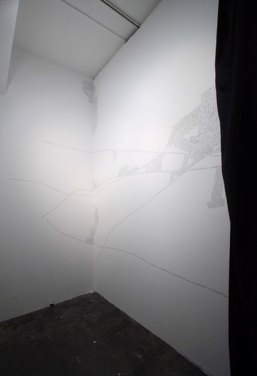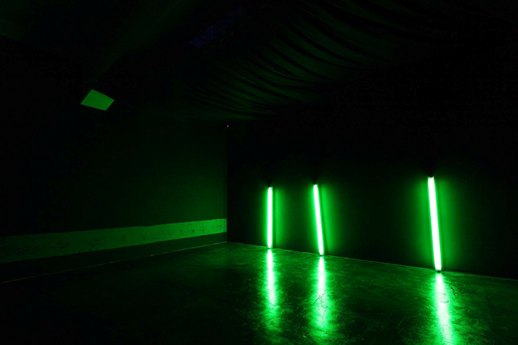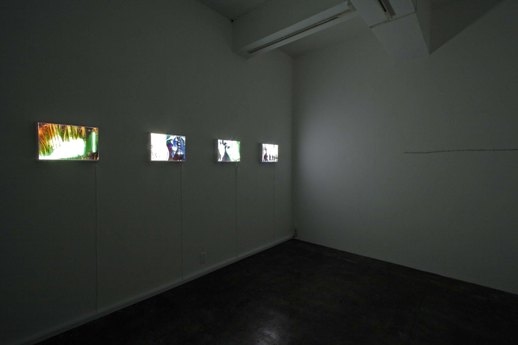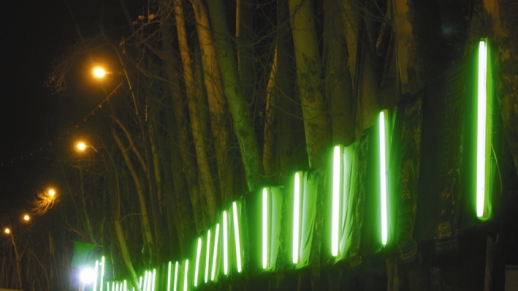Seven Vaults of the Sky
Sara Dolatabadi has an acute eye for decorations. But she doesn’t stop at their everyday usage; she probes for their deeper significance.
Her recent obsession is green tubes of light, a vivid remembrance of her last trip home to Iran where she documented a festival in Tehran, the city she grew up in. Dolatabadi’s current work reflects on her homeland in a state of transformation and turmoil. Inside the works themselves is an emotionally charged aura that is quite rare in Tokyo exhibits. The social and political issues that Dolatabadi addresses in her work spark incipient questions about the future of Iranian society.
I sat down with Dolatabadi to discuss her recent show at Mizuma Art Gallery and inquire about her artistic approach.
I was struck by the text inscribed directly on the wall when first entering your show at Mizuma Art Gallery. What is the significance of this text that wraps into the doorway?
The poem reads “Full of clamor of this tale are the seven vaults of the sky. Behold the short-sighted people who ignore its significance.” It’s a rhyme by Hafez, a very well known poet in Iran. I try to give the idea of repeated voices by writing the same phrase over and over on the wall. It becomes stronger with repetition. I think the meaning of this rhyme suits the current situation in Iran.
 When did you start including script in your work?
When did you start including script in your work?
Around the same time I came to Japan. I was feeling lost and needed to write in my own language. Living abroad, I knew that nobody could read it so that was kind of a free feeling.
How has living in Japan changed your artistic practice?
Basically I am a painter.
In reference to your paintings you stated, “People are my main subjects.” How does this relate to your installation work?
People are still my main subjects. I don’t necessarily draw their bodies. It is more the presence of the people, the voice of the people I am concerned with.
You have also changed your media of expression to photo light boxes and installation since moving to Japan.
My recent work is more social and political now. I continue my painting practice but I am always looking for the right medium of expression.
What are you working on right now?
I’m working on paintings. I consider them equal to my installation works.
Let’s return to your show at Mizuma Art Gallery. The main room of the gallery is completely dark besides the green light tubes standing against the wall.
In the installation I wanted to contrast darkness and lightness. The role of the artist is to give a clue that gives the audience the chance to make links in their own mind.

How about the words that are scratched into the wall in dark gray on the left side of the wall?
It’s a banner used in the Ashura festival. I found similarities between the situation in Iran after election and the festival known as Ashura.
Can you tell me more about your feelings regarding the Ashura festival?
Ashura is the celebration of the death of an Imam, or Islamic leader. Like many Iranians I have very clear memories of the Ashura festival from my childhood. It is full of colors but at the same time there is a gloomy ambiance. It is full of voices, different voices, very loud, lots of lights and decoration — with people, more people and people in black.
So now the festival has a political significance in Iran?
That is my point of view. Maybe no one else is thinking like that.
Really?
I find the mood to be similar. For example people chanting and screaming from the rooftop, not only showing their discontent and disagreement but also mourning for their lost people. All this is very similar to aspects of the religious festival. I think they are also mourning for something that has been lost.
How did it feel when you found out about the results of the June elections in Iran?
Before the elections there was very peaceful campaigning on both sides. People were marching on the street and passing each other. Everyone was on the street and there was a very popular movement for the reformist candidates. That was really amazing.
When you heard about the violence and protests that followed the election from here in Tokyo how does it make you feel?
I feel very sad, just deeply sad.
A feeling of sympathy for your friends and family?
Not just them but more generally for the people of Iran.

How about the future situation of Iranian women?
Women and young people in general took to the election in a new way this time. They were really coming out and trying to make a change.
How have people reacted to your works in Iran versus in Japan?
I think people are the same everywhere. Humans are human.
Yes, but do the green lights have a different meaning in Tokyo than they do in Tehran? What would happen if you displayed the green light tubes in Tehran?
There is no need to display the lights in Iran because everyone sees them in their daily life and they know the references to the religious festival. The green lights just happened to coincide with the elections in my mind. I want to orient people’s consciousness so they can realize the meaning of green lights has shifted. It has a religious meaning and now it has another aspect.
So the primary significance of the green lights was religious and now the secondary meaning of the lights is becoming political. When you bring the green lights to Tokyo they take on a third meaning in an Asian context. Then comes an unknown fourth meaning based on where they might be seen next.
Green has a strong religious meaning in Muslim countries, especially Shiite countries like Iran. When you are going down the street whenever you see a green light, most probably you can follow the light and find a mosque or pilgrims. It is a religious decoration.

How about your artistic influences?
It’s difficult question…I don’t know. We receive many influences but we are barely aware of them.
It’s more about subconscious influences?
I guess so.
How do you feel about the work of Iranian artist Shirin Neshat?
She is a great artist. What I like about her most is that she is honest. There are SO many artists that are not honest. That’s enough really; what it comes down to is it’s all about honesty.
James Jack
James Jack



